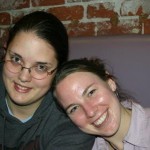
Casey is my dearest and unlikeliest of friends. In college she was assigned to live in the dorm that I shared with five Christian women, in a suite affectionately known as the “God Pod.” Casey was openly gay and openly hostile towards Christianity. After the things some Christians had said to her — that God hated her, that she was going to hell, that she was an abomination in God’s eyes — who could blame her?
During the year that we lived together, Casey was curious about the fact that we worshiped God and that we respected her, that we loved Jesus and also loved her. She joined us at our Christian fellowship meetings and tagged along to church. We even did Bible studies together so she could learn more about the real Jesus, not the hateful God she had heard about. But as Casey came to believe that Jesus was God and that He might even love her, we had to confront one final, urgent question: Could she be gay and Christian?
Casey began reading every book she could find about Christianity and homosexuality, and she shared what she found with me. We came to believe that the scriptures that apparently speak to homosexuality (what Casey called “the clobber verses”), on closer inspection, may be about something else. They seem to be more about idolatry, pedophilia, and orgies rather than about God-fearing gay people.
Casey came to hear God’s voice of love, calling her to Himself, calling her by name: “Casey, my daughter, my beloved.” On one beautiful, stormy night, Casey responded to her God. And the thunder sounded like shouts of “Amen! Amen! Amen!”
Now when Casey talks about her faith in Jesus, many of her gay friends react with scorn and disbelief. Some Christians have hurt them deeply, walking in parades with signs that read, “God hates fags”; posting Facebook comments such as, “It’s really sad that you’ve rejected the Bible”; pouring money into campaigns denying them the same rights as everyone else; and publicly stating that same-sex couples threaten marriages and children. Still, Casey defends the God that she has come to know and love: the God of the oppressed, the powerless, the orphan, the husbandless, the childless, the stranger, the Samaritan, the eunuch. With a little thought, we can recognize our gay brothers and sisters in any of these.
How you feel about Casey’s spiritual journey likely depends on whether you believe that homosexual behavior is sinful or not. Coming from the community of believers that I do, as an Evangelical Christian raised in the Covenant Church, I can relate deeply to the concerns raised by loving Christian people on this subject. Until a few years ago, if I thought about homosexuality at all, I would reason that it was not God’s design; that gay people can be faithful Christians only if they are celibate; that people may be born with alcoholic tendencies, but they still shouldn’t drink; that we can love the sinner but hate the sin.
I believe that, in our words and convictions on this subject, Covenanters — both straight and gay — are motivated by love, sincerity, and a desire to be faithful to our calling. Part of my journey with Casey has been coming to believe that likening same-sex orientation to a disease, a divine error, or a sin — no matter how kindly or sincerely stated — is not loving to the gay people in our congregations.
I also believe that our discussion about this topic — nay, these friends — has generated too much heat and too little light. I recently revisited Ephesians 4, home of “clobber verses” 18-19, and I think that the earlier part of the chapter may be relevant to our conversation.
As we — gay or straight or ally — wrestle with how to live a life worthy of the calling we have received, let us be completely humble and gentle, patient and bearing with one another in love. Let us make every effort to maintain the unity of the Spirit through His bond of peace. Let us remember that there is only one body and one Spirit, only one hope to which we all have been called. One God is Father to us all, He who is over all of us, through all of us, and in all of us. Let us remember that we are all part of one body, joined together by every supporting ligament as each part does its work. Let us remember the diversity of our parts, seemingly strangers to one another, and yet guided by Christ our head. Brothers and sisters, let us speak kindly to one another, submitting our ideas of God’s truth to the measure of His love.
I am an ally on a journey, not yet arrived, not even sure of what the destination will be. But I trust that God will lead me, and all of us, in His way of love if we let Him.
We will work with each other,
We will work side by side.
We will work with each other,
We will work side by side.
And we’ll guard each one’s dignity
And save each one’s pride.
And they’ll know we are Christians by our love,
By our love.
Yes, they’ll know we are Christians by our love.
Amy and Casey both attend The Riverside Covenant Church, a church plant in Washington, D.C. We will be posting Casey’s own story here in the next few days, so check back soon. (“Like” us on Facebook to get notifications of new posts in your news feed!)